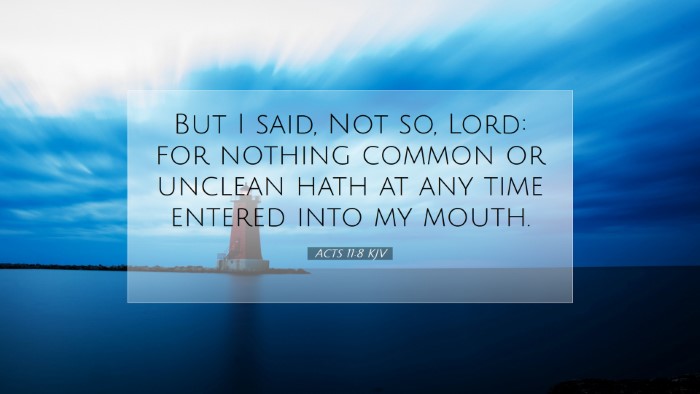Commentary on Acts 11:8
Verse Context: Acts 11:8 states: "But I said, Not so, Lord; for nothing common or unclean hath at any time entered into my mouth." In this passage, Peter recounts his vision and the subsequent struggle he faced in understanding the implications of God's command regarding clean and unclean animals.
General Overview
This verse is crucial in the narrative found in the Acts of the Apostles as it marks a significant turning point regarding the inclusion of Gentiles in the Christian faith. It reveals Peter’s initial resistance to the divine revelation, reflecting a struggle that many believers may face when encountering a shift in understanding regarding God’s will.
Insights from Matthew Henry
Transformational Revelation: Henry emphasizes the transformative power of God’s revelations. He notes that Peter’s response illustrates a human inclination towards the status quo, particularly concerning Jewish dietary laws and the purity customs of the time. This moment signifies a divine challenge to deeply held beliefs, urging believers to expand their understanding of God’s inclusiveness.
Human Resistance:
Henry elaborates on the idea that it is common for humans to resist God’s invitations due to tradition. Peter’s plea to God reinforces how cultural biases can overshadow divine direction. Henry encourages believers to be open to change and to recognize that God's purposes might extend beyond their previous understandings.
Insights from Albert Barnes
God’s Sovereignty in Dispelling Boundaries: Barnes highlights the sovereignty of God in addressing the prejudices of His people. He points out that Peter’s declaration of unclean meat symbolized a broader spiritual truth — that God’s grace is not confined to ethnic or cultural boundaries.
Divine Instruction:
Barnes notes that Peter’s hesitance reflects a broader theological nuance, demonstrating that even apostles are susceptible to misinterpretation of God’s will. He elucidates that God’s commandments often challenge human tradition, positioning believers to be vessels of His gospel regardless of societal divisions.
Insights from Adam Clarke
Cultural and Theological Implications: Clarke delves into the cultural context of Peter’s statement. He establishes that the dietary laws were not merely traditional but a covenantal sign of the Jewish identity. By saying “Not so, Lord,” Clarke indicates Peter’s struggle with reconciling his identity with God’s broader plan.
Understanding Divine Commands:
Clarke considers this moment pivotal for the church, marking a clear separation of the old covenant’s restrictions. He suggests that Peter’s experience serves as a lesson for modern readers about obedience in the face of divine command and understanding that such commands may lead to a radical departure from prior beliefs.
Theological Implications
This verse raises significant theological questions regarding the nature of authority, obedience, and God’s mission. It underlines the importance of adaptability within spiritual leadership, showcasing the necessity of relying on divine guidance over human understanding.
Application for Today's Believers
Openness to Change: Pastors and theologians must remember that God may require believers today to reevaluate their own biases and traditions in light of God’s loving call for inclusivity.
- Prayer and Discernment: Encourage fervent prayer and seeking God’s wisdom in navigating cultural shifts within the church.
- Inclusivity in Ministry: Foster an environment where all individuals, regardless of background, find acceptance and a place to grow in faith.
- Continuous Learning: Engage with scripture and church tradition in dynamic ways, learning from the examples of the early church leaders like Peter.
Conclusion
Acts 11:8 embodies a critical moment in the early church’s expansion, challenging believers to reconsider what is deemed acceptable and clean in their spiritual walks. This passage teaches that God's plans transcend human traditions, calling His followers to greater love, acceptance, and outreach. Through the insights of Matthew Henry, Albert Barnes, and Adam Clarke, modern-day believers are urged to embrace a mindset of openness and receptivity to the ongoing work of the Holy Spirit in shaping the church’s mission.


